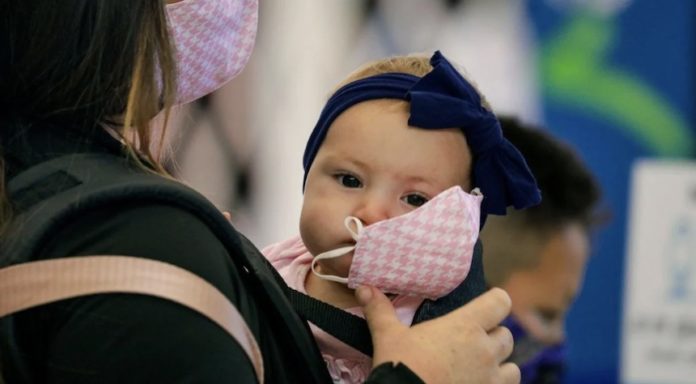The academic journal Archives of Disease in Childhood published a new study on October 11. It revealed that COVID-19 lockdowns and mask mandate adversely affected babies’ social communication skills. Lockdown babies were less likely than other cohorts to speak their first words before they turned one, and they also performed fewer nonverbal communication gestures.
A study by the Royal College of Surgeons in Ireland found significant declines in communication skills in infants born in the three months following the pandemic. The study found that there was a decrease in the number of milestones in social communication development among parents aged 12 months for 354 of the 354 babies surveyed. This is in comparison to a historical cohort.
Pre-pandemic, 89.3% of infants were capable of uttering one definite and meaningful word at 12 months. Only 76.6% of lockdown baby babies were capable. This is a decrease of 12.7 percentage points.
The study found that only 87.7% could say goodbye to lockdown babies by the age of 1; 94.4% were able. The babies’ ability to point dropped nine points.
Researchers found that babies were living in isolation in the early stages of the pandemic.
Masking faces may have had an impact on the behavior of babies, who “from 6 months old tend to shift their gaze away from the eyes towards the mouth.”
Clear masks would have likely not solved this problem, according to a 2021 study in “Developmental Science.” Infants couldn’t recognize familiar words being spoken by their wearers.
Some of the results from the Irish study were similar to those published by a Chinese research group in Frontiers in Pediatrics. They indicated that “public health strategies” related to the pandemic could be linked with a greater risk of delayed communication and fine motor development in 1-year-olds.
A Brown University study found that children born in the aftermath of the pandemic had significantly lower verbal, motor, and overall cognitive performance than those born before.
According to the Irish study “development of social communication depends on social engagement” low levels of community engagement among infants and caregivers were associated with developmental delay in non-pandemic settings.
Researchers concluded that COVID-19-era babies likely heard a smaller repertoire of languages and were more likely to have seen fewer unmasked faces.
They added a hopeful statement to the findings and suggested that babies’ social communication skills would improve due to their resilience and subsequent “societal regeneration.” They recommended following up with this cohort until they reach school age.
In 2020, 3.6 million children were born in the United States.




